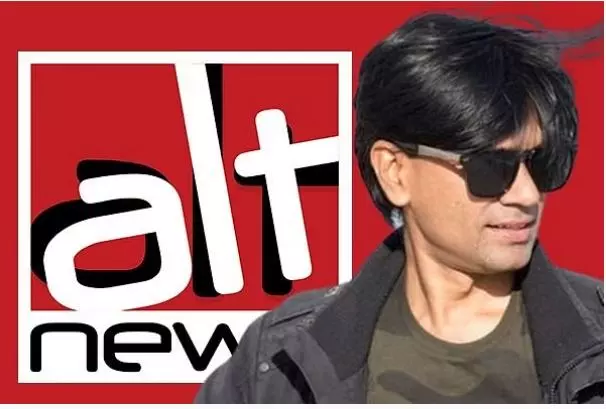
11 International rights groups criticise sedition case against Alt News' Zubair
text_fieldsNew Delhi: Eleven international human rights organisations, including Amnesty International and Reporters Without Borders, have criticised the sedition charge brought against journalist and fact-checker Mohammed Zubair, co-founder of Alt News, a fact-checking news outfit. Based on a complaint from Udita Tyagi, general secretary of the Yati Narsinghanand Saraswati Trust, the Ghaziabad police booked him under Section 152 of the Bharatiya Nyaya Sanhita (BNS), which criminalises activities that jeopardise India's sovereignty, unity, and integrity, The News Minute reported.
Following is the full statement:
International human rights organisations condemn the criminal complaint lodged against the award-winning journalist and fact-checker Mohammed Zubair and the continued use of sedition to target independent reporting and public interest speech.
On 27 November 2024, it was publicly announced that the Ghaziabad police had filed a First Information Report, or FIR, against Mohammed Zubair, an award-winning journalist and co-founder of Alt News, an India-based non-profit fact-checking website, based on legal provisions including Section 152 of the Bharatiya Nyaya Sanhita (BNS).
The FIR, first filed on 7 October, arises from his social media reporting of comments made by the controversial Hindu priest, Nati Narsinghanand. According to Bar and Bench, “The FIR was lodged consequent to a complaint filed by supporters of Yati Narsinghanand, the priest of Ghaziabad's Dasna Devi Temple over a tweet Zubair had posted on X.”
The FIR cites seven different legal provisions, including section 66 of the IT Act and different sections of the BNS, the 2023 reform of India’s penal code, which was passed during British colonial rule. Section 152 of the BNS was also invoked, which is the updated and modernised version of the sedition clause. Section 152 states that anyone who “excites or attempts to excite, secession or armed rebellion or subversive activities, or encourages feelings of separatist activities or endangers sovereignty or unity and integrity of India” could face “imprisonment for life or with imprisonment which may extend to seven years, and shall also be liable to fine.”
In its database, Article 14 “counts 13,000 people charged with sedition between 2010-2021” under the previous penal code, including journalists, protesters and social media users. The BNS includes expanded and modernised provisions related to sedition, to cover acts involving “electronic communication or by use of financial mean”. This suggests a far more expansive provision, with few safeguards in place to defend free expression. When the BNS was presented to parliament, Amit Shah, the Home Minister gave this justification in reference to the existing penal code: “[t]he foundation of these procedures was to protect the British, not the common people of India.” While the need to reform and modernise laws is important, especially as technologies evolve and to address the legacy of colonial law-making, this reform appears more focused on who can use the law to target dissent as opposed to protecting against the law being used in this manner.
Mohammed Zubair has long been targeted by Indian authorities for his fact-checking, journalism and use of social media. In June 2022, he was arrested by the Delhi and Uttar Pradesh state police for a tweet related to comments made by a BJP spokesperson on national TV and another satirical tweet posted in 2018. Zubair was charged with "promoting enmity between different groups on grounds of religion, race, place of birth, residence, language, etc." and “deliberate and malicious acts, intended to outrage religious feelings of any class by insulting its religion or religious beliefs”. Whenever he was granted bail in one case, another FIR would be lodged. Ultimately six were lodged against Zubair, ensnaring him in a 24-day cycle of arrest, bail and re-arrest. The following month, the Indian Supreme Court granted Zubair bail and ordered his release. As a result of Zubair’s journalism and commitment to media freedom, he won the Journalism Award at the 2023 Index on Censorship Freedom of Expression awards.
Mohammed Zubair has filed a petition to grant interim bail and quash the FIR. On 3 December, the case was heard by Allahabad High Court but the bench recused themselves, with a future hearing planned. The below signed organisations join Indian stakeholders, including the Press Club of India and DIGIPUB News India Foundation calling for the FIR to be withdrawn immediately and for the Indian government to protect free expression.
Signatories:
Index on Censorship
PEN International
Digital Rights Foundation
Reporters Without Borders (RSF)
International Press Institute (IPI)
Electronic Frontier Foundation
International Federation of Journalists (IFJ)
Amnesty International
Human Rights Watch
Committee to Protect Journalists
IFEX























